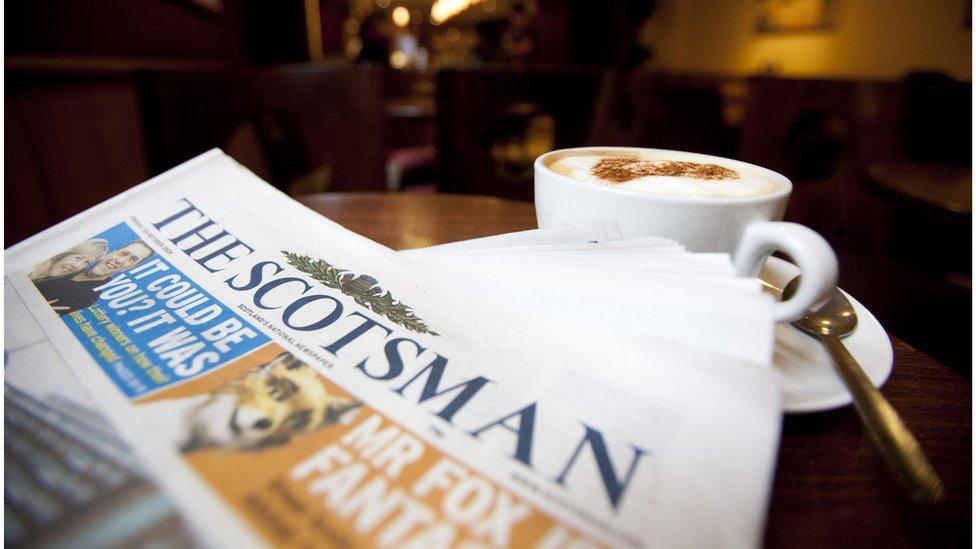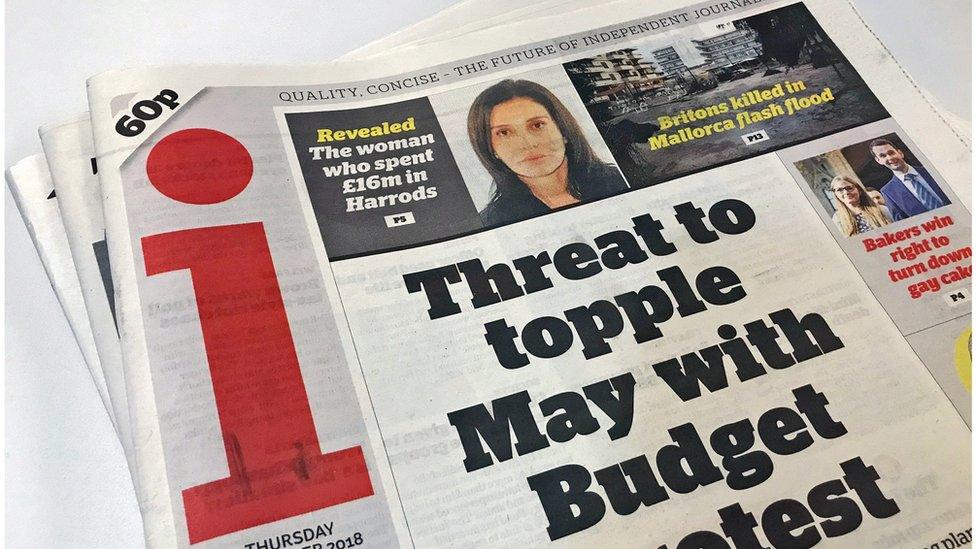Press feels the heat
- Published
Edinburgh-based Johnston Press, publisher of The Scotsman, has been weighed down by debt, and cannot find anyone to refinance it, so it's up for sale.
A failure to find a buyer in private does not bode well for a public sale. Insolvency could follow by next June.
A government-commissioned review of local and regional newspapers is looking to ways in which they might be secured.

Johnston Press, which publishes the Scotsman, is seeking buyers amid the decline of newspapers
Want to buy a newspaper? The not-very-funny joke is that it may not cost you much more than £1.50. Indeed, a peppercorn quid is probably going to be enough if you're willing to put Johnston Press out of its financial misery.
For that, you get the 'i' compact newspaper, The Scotsman, Scotland on Sunday, the Edinburgh Evening News, the Yorkshire Post and around 200 local titles.
When you consider that the three Edinburgh titles, that share the company's head office in a middle market office block outside the city centre, were bought for £160 million only 12 years ago, that seems a pretty good deal. It's also well short of the recent market capitalisation, of less than £4m.
The catch, as you're probably already aware, is the £220m debt that comes with it - a vast hangover from a reckless borrowing binge before 2008.
That has weighed very heavily on this company, as it has laboured hard to reduce the lending pile from more than £300m.
That hasn't just been down to the strenuous efforts of successive finance directors. The labouring has been by journalists and advertising sales staff, who have suffered the consequences of under-investment and ferocious cost-cutting.
Slimline products
It's been a painful experience for many of the readers as well, finding newspapers that had been woven into their daily and weekly lives have slimmed, crumbled in quality, and risen in cover price.
They can get most of the articles in The Scotsman and other titles for free online, which has obviously undermined print sales with their more lucrative advertising. Growth in digital advertising was supposed to replace the declining print spend, but at Johnston, even digital ad revenue fell 7% in the first half of this year.
That was while classified advertising was down a whopping 28% in only a year.
The 8% annual cost that lenders have charged for their £220m has weighed heavily as well. And there is one way of looking at this that might make it a tad more attractive.
I'm told that a clause in the debt contracts requires that a change of ownership for the company means that debt would have to be repaid immediately.
So suppose a buyer with deep pockets or a better credit rating were able to fund that £220m at much lower rates of, say, 2%. That would mean paying only a quarter of the current annual interest bill.
It's still a lot of money though, on assets for which the future market looks uncertain, and for which a lot of additional investment is required if the titles are to make the transition to the world of digital news publishing.
Turning a profit
What marks this sale out is that it's not the way these things are generally done. It fits with the rules of the Takeover Panel, allowing potential buyers anonymity. But doing so in public is not usually necessary.
What you might expect is that Rothschild, the adviser on refinancing Johnston Press, would go out to find a trade buyer. At worst, Johnston could be pushed into administration, and with a pre-pack deal, all its assets could instantly emerge under the ownership of another publisher with the resources to invest and the incentive to consolidate with its existing portfolio of titles.
Whatever that publisher is willing to pay would go to creditors, with bondholders at the front of the queue.
But in this case, for 18 months or so, the bondholders have held out against refinancing options. A small parcel of assets were sold off. There was an attempt to reassure them that the pension fund could be passed on to the Pension Protection Fund. But still, no buyer has emerged.

The ebullient Norwegian, London-based entrepreneur Christen Ager-Hanssen, through his Custos Group, is Johnston's biggest shareholder with a 20% stake. He has talked of big plans to invest in the digital transition, blaming Johnston's management for ineptitude.
After much public criticism by him and an attempt at a shareholder coup, Johnston Press invited him in July to explain how he could do that. If he did, it doesn't seem to have come to much, yet - only his warning in the trade media that a pre-pack deal would face a legal challenge.
If there's still no buyer further down the road, and with that debt being repayable in June next year, it's hard to foresee an alternative to insolvency. That would hurt bondholders, shareholders and, to a lesser extent, pensioners.
But it might be a starting point for recovery for some newspapers, if these assets were to be sold on by a liquidator to companies with the funds to invest.
The titles are still turning an underlying profit. The Scotsman brand has potential if it gets investment. A company like DC Thomson, family-owned publisher of the Dundee Courier and the Press & Journal, could give it a try if it has the appetite for a challenge.
And across Britain, the 'i' - a recent addition to the Johnston stable of titles - has performed fairly well. It also seems unlikely to shut even if Johnston Press ceases to roll.
Scrutiny
Busy in the background to all this is Dame Frances Cairncross. She was commissioned by the Prime Minister to review the state of local and 'regional' media. (From London, Scotland's national newspapers are seen as 'regional'. I know - not my choice.)
This is a political response to the sense that a key element of city, town and community life is being lost as local papers close. They're doing so at a faster rate in England than in Scotland.
One response has been a top-slicing of funds from the TV licence fee, paid by most households, to pay for coverage by independent journalists of local councils. Without such scrutiny, who knows what councillors and officials would get up to?

Dame Frances, a former journalist and academic with a strong Scottish pedigree, is also looking at the power of Facebook and Google in controlling or shaping online access to news, and whether these companies have grabbed an unfair advantage over news publishers through the opaque means by which they sell advertising.
An opinion survey for the Cairncross review, carried out in August, points to more people reading national newspapers online than in print, which may be a first. There's a gap there of 28% to 22%.
It suggests also that people want local news. They tell pollsters that there is sufficient local news. Yet only 13% actually said they read a local paper, and 13% read one online.
That is what they politely call "a disconnect". In other words, opinion surveys tend towards demonstrating that the public can be frustratingly inconsistent.
- Published11 October 2018
